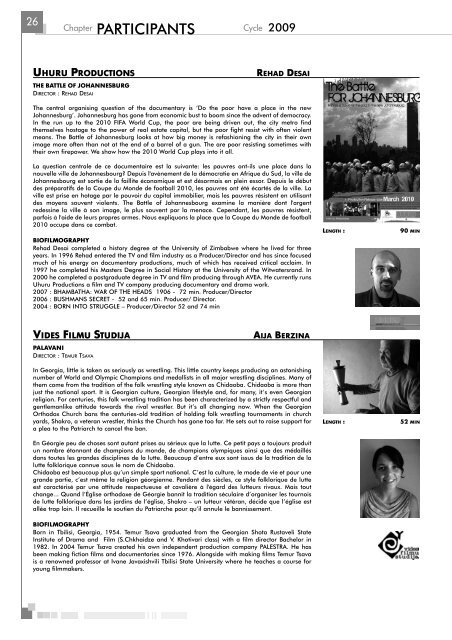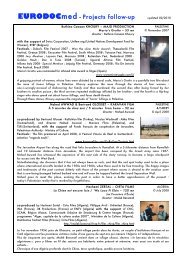Couv Cat 2009 - Eurodoc
Couv Cat 2009 - Eurodoc
Couv Cat 2009 - Eurodoc
- TAGS
- couv
- eurodoc
- eurodoc-net.com
You also want an ePaper? Increase the reach of your titles
YUMPU automatically turns print PDFs into web optimized ePapers that Google loves.
26<br />
Chapter<br />
PARTICIPANTS<br />
Cycle <strong>2009</strong><br />
UHURU PRODUCTIONS REHAD DESAI<br />
THE BATTLE OF JOHANNESBURG<br />
DIRECTOR : REHAD DESAI<br />
The central organising question of the documentary is ‘Do the poor have a place in the new<br />
Johannesburg’. Johannesburg has gone from economic bust to boom since the advent of democracy.<br />
In the run up to the 2010 FIFA World Cup, the poor are being driven out, the city metro find<br />
themselves hostage to the power of real estate capital, but the poor fight resist with often violent<br />
means. The Battle of Johannesburg looks at how big money is refashioning the city in their own<br />
image more often than not at the end of a barrel of a gun. The are poor resisting sometimes with<br />
their own firepower. We show how the 2010 World Cup plays into it all.<br />
La question centrale de ce documentaire est la suivante: les pauvres ont-ils une place dans la<br />
nouvelle ville de Johannesbourg? Depuis l'avènement de la démocratie en Afrique du Sud, la ville de<br />
Johannesbourg est sortie de la faillite économique et est désormais en plein essor. Depuis le début<br />
des préparatifs de la Coupe du Monde de football 2010, les pauvres ont été écartés de la ville. La<br />
ville est prise en hotage par le pouvoir du capital immobilier, mais les pauvres résistent en utilisant<br />
des moyens souvent violents. The Battle of Johannesbourg examine la manière dont l'argent<br />
redessine la ville à son image, le plus souvent par la menace. Cependant, les pauvres résistent,<br />
parfois à l'aide de leurs propres armes. Nous expliquons la place que la Coupe du Monde de football<br />
2010 occupe dans ce combat.<br />
BIOFILMOGRAPHY<br />
Rehad Desai completed a history degree at the University of Zimbabwe where he lived for three<br />
years. In 1996 Rehad entered the TV and film industry as a Producer/Director and has since focused<br />
much of his energy on documentary productions, much of which has received critical acclaim. In<br />
1997 he completed his Masters Degree in Social History at the University of the Witwatersrand. In<br />
2000 he completed a postgraduate degree in TV and film producing through AVEA. He currently runs<br />
Uhuru Productions a film and TV company producing documentary and drama work.<br />
2007 : BHAMBATHA: WAR OF THE HEADS 1906 - 72 min. Producer/Director<br />
2006 : BUSHMANS SECRET - 52 and 65 min. Producer/ Director.<br />
2004 : BORN INTO STRUGGLE – Producer/Director 52 and 74 min<br />
VIDES FILMU STUDIJA AIJA BERZINA<br />
PALAVANI<br />
DIRECTOR : TEMUR TSAVA<br />
In Georgia, little is taken as seriously as wrestling. This little country keeps producing an astonishing<br />
number of World and Olympic Champions and medallists in all major wrestling disciplines. Many of<br />
them come from the tradition of the folk wrestling style known as Chidaoba. Chidaoba is more than<br />
just the national sport. It is Georgian culture, Georgian lifestyle and, for many, it’s even Georgian<br />
religion. For centuries, this folk wrestling tradition has been characterized by a strictly respectful and<br />
gentlemanlike attitude towards the rival wrestler. But it’s all changing now. When the Georgian<br />
Orthodox Church bans the centuries-old tradition of holding folk wrestling tournaments in church<br />
yards, Shakro, a veteran wrestler, thinks the Church has gone too far. He sets out to raise support for<br />
a plea to the Patriarch to cancel the ban.<br />
En Géorgie peu de choses sont autant prises au sérieux que la lutte. Ce petit pays a toujours produit<br />
un nombre étonnant de champions du monde, de champions olympiques ainsi que des médaillés<br />
dans toutes les grandes disciplines de la lutte. Beaucoup d’entre eux sont issus de la tradition de la<br />
lutte folklorique connue sous le nom de Chidaoba.<br />
Chidaoba est beaucoup plus qu’un simple sport national. C’est la culture, le mode de vie et pour une<br />
grande partie, c’est même la religion géorgienne. Pendant des siècles, ce style folklorique de lutte<br />
est caractérisé par une attitude respectueuse et cavalière à l'égard des lutteurs rivaux. Mais tout<br />
change... Quand l’Église orthodoxe de Géorgie bannit la tradition séculaire d’organiser les tournois<br />
de lutte folklorique dans les jardins de l’église, Shakro – un lutteur vétéran, décide que l’église est<br />
allée trop loin. Il recueille le soutien du Patriarche pour qu’il annule le bannissement.<br />
BIOFILMOGRAPHY<br />
Born in Tbilisi, Georgia, 1954. Temur Tsava graduated from the Georgian Shota Rustaveli State<br />
Institute of Drama and Film (S.Chkhaidze and V. Khotivari class) with a film director Bachelor in<br />
1982. In 2004 Temur Tsava created his own independent production company PALESTRA. He has<br />
been making fiction films and documentaries since 1976. Alongside with making films Temur Tsava<br />
is a renowned professor at Ivane Javaxishvili Tbilisi State University where he teaches a course for<br />
young filmmakers.<br />
LENGTH : 90 MIN<br />
LENGTH : 52 MIN



